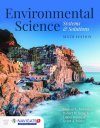About this book
What is the "big picture" in environmental science? This is the take on this subject in Environmental Science: Systems and Solutions, Sixth Edition. Whether you view the subject through a scientific, social, political, or historical lens, you'll find the concrete foundations here that work for courses in both environmental science and environmental studies. A systems approach is the connective fabric that makes sense of the wealth of topics and data, which demonstrates how aspects of the natural environment interconnect with each other and with human society. A section on Resource Use and Management introduces the concept of sustainability, and another on Dealing with Environmental Degradation discusses threats to the environment and mitigation strategies. A bonus section available online on Social Solutions to Environmental Concerns, discusses the complex issues impacting the environment and the scientific, technologic, and human behavioral ways to address them. Throughout the text you will find the hard data necessary for a scientific study of the environment and the measured analysis ideal for our time.
Combining evidence-based, contemporary information and data with relevant case studies, practical applications, numerous calculations, and modern references, Environmental Science: Systems and Solutions teaches and engages.
Contents
Section 1 The Environment and People
Chapter 1 Environmental Science: An Overview
Chapter 2 Human Population Growth
Section 2 The Environment and History of Life on Planet Earth
Chapter 3 The Ever Changing Earth: The Biosphere and Biogeochemical Cycles
Chapter 4 The Distribution of Life on Earth
Chapter 5 The Dynamic Earth and Natural Hazards
Section 3 Resource Use and Management
Chapter 6 People and Natural Resources
Chapter 7 Fundamentals of Energy, Fossil Fuels, and Nuclear Energy
Chapter 8 Renewable and Alternative Energy Sources
Chapter 9 Water Resources
Chapter 10 Mineral Resources
Chapter 11 Conserving Biological Resources
Chapter 12 Land Resources and Management
Chapter 13 Food and Soil Resource
Section 4 Dealing with Environmental Degradation
Chapter 14 Principles of Pollution Control, Toxicology, and Risk
Chapter 15 Water Pollution
Chapter 16 Air Pollution: Local and Regional
Chapter 17 Global Air Pollution: Destruction of the Ozone Layer and Global Climate Change
Chapter 18 Municipal Solid Waste and Hazardous Waste
Section 5 Social Solutions to Environmental Concerns (online only)
Chapter 19 Environmental Economics (online only)
Chapter 20 Historical and Cultural Aspects of Environmental Concerns (online only)
Customer Reviews
Biography
Michael L. McKinney is Director of the Environmental Studies Program at the University of Tennessee, Knoxville. He is also a Professor in the Geological Science Department and the Ecology & Evolutionary Biology Department. Since 1985, he has taught a variety of courses, focusing on environmental science and biodiversity issues at the undergraduate level.
Robert M. Schoch, a full-time faculty member of the College of General Studies at Boston University, received his Ph.D. in geology and geophysics from Yale University in 1983. Since 1984, he has specialized in teaching undergraduate science, including environmental science, biology, physical science, geology, geography, and courses in science and public policy – with a strong environmental component in all courses he teaches. He is a recipient of his college’s Peyton Richter Award for interdisciplinary teaching, and serves as director of its Institute for the Study of the Origins of Civilization.
Logan Yonavjak is an investment professional who has worked with a variety of organizations on a suite of projects ranging from ESG product development, the development of social and environmental impact metrics methodologies, and a variety of renewable energy and conservation finance deals. She is currently the Manager of Research and Analysis at CREO Syndicate, a network of family offices focused on driving more private capital to solve global environmental challenges. More recently she worked at Morgan Stanley's Institute for Sustainable Investing, Align Impact, and the Yale Investments Office. Logan received her B.A. with Distinction from the University of North Carolina at Chapel Hill. Logan is a Startingbloc Fellow, a Property and Environment Research (PERC) Fellow and a Kinship Fellow. She has also been a freelance writer for Ashoka Changemakers, Forbes, ImpactAlpha, and Nextbillion, and is also the author of several books. Logan received her Masters in Forestry and MBA (with a concentration in Asset Management) from Yale in 2016. Logan currently sits on the Board of Slow Money NYC, which connects investors with local food entrepreneurs in NYC, and she is also an Advisor to the Yale Initiative on Sustainable Investing (YISF).
Grant A. Mincy is an Instructor of Biology at Pellissippi State Community in Knoxville, Tennessee where he leads the Concepts of Biology curriculum, teaches General Biology and offers a course inConservation Science. He has also taught Physical Geology, Historical Geology and Environmental Geology. In the classroom, Grant includes information regarding issues of concern in his town of Knoxville and the Southern Appalachian Bio-Region in general. He also likes to discuss local environmental policy and new sustainable initiatives having great success in the area as well.


































